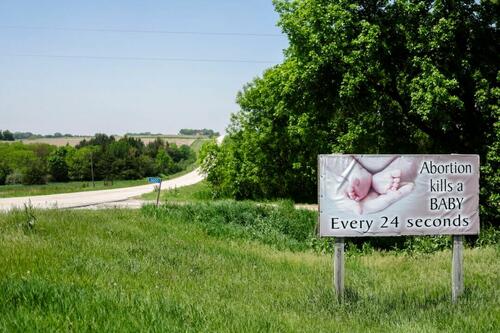Authored by Tom Ozimek via The Epoch Times (emphasis ours),
The Nebraska Supreme Court has ruled that a law combining abortion restrictions with limits to gender-altering procedures for minors does not violate the state’s constitution, which requires bills to be confined to a single subject.

The state’s high court acknowledged in a split decision on July 26 that abortion and gender-altering care are “distinct types of medical care” but that the law, LB574, does not violate Nebraska’s single-subject rule because both abortion and transgender procedures fall under the subject of medical care.
The law, which imposes a ban on abortion beyond 12 weeks’ gestation and includes regulation of puberty blockers for minors and a ban on gender-altering surgeries for minors, was challenged by the American Civil Liberties Union (ACLU) representing Planned Parenthood in Nebraska.
A district judge dismissed the lawsuit last August, and Planned Parenthood appealed, with the key premise being a violation of Article III Section 14 of the Nebraska Constitution, which requires single-subject bills.
Lawmakers in the Nebraska Legislature had originally proposed separate bills, one banning abortion at about six weeks of pregnancy and another restricting transgender procedures for minors. However, the GOP-dominated Legislature added the abortion ban bill to the existing gender-altering care bill when the abortion ban failed to defeat a filibuster.
In arguments before the Nebraska Supreme Court in March, an attorney for the state argued that both abortion and gender-altering measures fall under the subject of health care and so the law does not violate the constitutional single-subject restriction.
By contrast, an attorney for Planned Parenthood argued that the bills deal with distinct subjects in violation of the constitution and that even the Legislature recognized this by introducing the abortion and transgender bills separately.
The majority on the Nebraska Supreme Court disagreed with the arguments put forward by Planned Parenthood, finding that while abortion and gender-altering care are distinct types of medical care, they “certainly are encompassed within the regulation of permissible medical care.”
“After our review of the facts of this case and our historical legal precedent wherein we have rarely found violations of Neb. Const. art. III, § 14, we find no merit to Planned Parenthood’s argument that L.B. 574 contains more than one subject in violation” of the state constitution, the high court’s majority opinion states.
“Unlike our dissenting colleague, and particularly in the absence of a suggestion that the title given by the Legislature was misleading, we decline to reject the elected representatives’ articulation of a subject in the guise of a search for the perfect title.
“We find Planned Parenthood’s assignments of error to be without merit. We affirm the decision of the district court.”
Several justices dissented, with one arguing that the Legislature had the duty under the constitutional amendment to “compose legislation, including titling, which stated ‘one subject’; failure to so compose renders the bill unconstitutional. It is not the role of this court to rescue legislative bills.”
The amended title of the combined LB574 was the Adopt the Let Them Grow Act and the Preborn Child Protection Act, and it provides for discipline under the Uniform Credentialing Act, with part of the dissenting judge’s objection focusing on the complexity of the title.
Another line of dissent was that the bill contained “unrelated acts, i.e., abortion and gender-affirming care,” and that it included sections that don’t relate to the regulation of medical professionals, in violation of the single-subject constitutional constraint.
Nebraska Gov. Jim Pillen issued a statement praising the ruling, saying he’s “grateful for the court’s thorough and well-reasoned opinion upholding these important protections for life and children in Nebraska.”
“There was a dark moment last year when many feared that a victory for unborn babies was impossible and that the pro-life coalition might break apart,” he said. “I was honored to partner with faithful allies and leaders across the state to combine the abortion ban with protections for kids against irreversible sex change surgeries.”
ACLU of Nebraska issued a statement calling the state Supreme Court’s decision to uphold the lower court ruling “devastating” and vowing to continue fighting for its position on the matter.
“This is devastating news for impacted Nebraskans, but it won’t be the final word on abortion access or the rights of trans youth and their families in Nebraska. We’ll continue doing all we can to ensure that these decisions rest with Nebraskans, not the government,” it said.
At least 25 states have adopted laws restricting or banning gender-altering procedures for transgender minors, with most of them facing lawsuits.
Since the U.S. Supreme Court overturned Roe v. Wade in 2022 and handed the matter of regulating abortion access over to the states to determine, most Republican-controlled states have advanced legislation that restricts abortion or started enforcing existing laws that had been blocked.